The world could change faster than you think
RN Bhaskar
Recent developments have the potential to compel people to shed any preconceived notions of the way strategies could play out. The world is changing faster than anyone could imagine.
The first is China’s decision to create an alternative route to the Panama Canal (https://www.youtube.com/watch?v=LS5AMqHiWSw). As the video explains, China plans to build a dry canal over Colombian territory to connect the Atlantic and the Pacific oceans. This would largely mitigate the declining waters in the existing Panama Canal on account of drought.
That in turn has made many ships take the perilous trip round the southernmost tip of South American. The dry canal –a rail bridge from one shore to another — would be in sync with China’s Belt and Road Initiative. It would benefit Colombia because it would now have a source for funds which could wean its people away from the drug mafia. It could consolidate China’s relations with Colombia which is gifted with huge mineral reserves. It gives a breather for cargo that must traverse from the Pacific to the Atlantic, or the other way around. But most importantly, it reshapes global logistics and reduces the US sphere of influence.
The Eastern world collaborations
Then there is the incredible tie-up between Vladmir Putin of Russia and Kim Jong Un of North Korea. The agreement is far reaching because it covers military, civilian and even food security. Compare the offer of wheat to North Korea with the humiliating PL 480 clauses India was compelled to sign during the ‘50s and the ‘60s ‘sixties to get US wheat (https://rbidocs.rbi.org.in/rdocs/content/PDFs/90043.pdf). The world is becoming weary of the imperiousness that the US has shown all along.
The implications of this tie-up have been explained brilliantly by Scott Ritter at https://www.youtube.com/live/36IDxJI1170 . Ritter is a defence analyst and a member of a member of the Veteran Intelligence Professionals for Sanity.
By tying up with North Korea, Putin has effectively told the Western world that if it troubles him through Ukraine, he could create trouble through North Korea for all the countries in that region who owe their loyalties to the US. It adds a new paradigm to global affairs and war manoeuvres, because North Korea has ballistic missiles.
It has a military nuclear weapons program as well, and is estimated to have an arsenal of approximately 50 nuclear weapons and sufficient production of fissile material for six to seven nuclear weapons per year. Negotiations between the United States and North Korea have proceeded in fits and starts for decades. They seemed to move under Trump, but have stalled under Joe Biden. Effectively, the west has failed to halt the advance of North Korea’s nuclear and missile programs. (https://www.cfr.org/timeline/north-korean-nuclear-negotiations). With China as a friend in the North, and Russia as a defence partner, North Korea is now a force to be reckoned with. The ability of the US to play games in this part of the world is likely to get curtailed significantly.
For decades, Russia has controlled the seas near the ice caps, especially when they begin to melt for a few months. All vessels passing through the Northern Sea Route are required to be piloted by Russians. The country also requires that passing vessels pay tolls and provide advance notice of their plans to use the route (https://www.sciencedaily.com/releases/2022/06/220620152119.htm).
But with the ice melting, shipping will move out of Russian territorial waters and into international waters. However, with Russia and China now having an alliance, both countries will now dominate these waterways. The new routes could enable shipping companies to reduce their greenhouse gas emissions by about 24% while also saving money and time. “This is because the route between Yokohama (Japan) and Rotterdam (Netherlands) gets reduced 7,200km, while typical shipping routes between South Korea and the Netherlands are reduced on average by 6,300km and between China and the Netherlands by 4.500km” says an LSE Blog (https://blogs.lse.ac.uk/businessreview/2018/08/08/melting-ice-caps-will-open-the-northern-sea-to-commercial-traffic-and-change-world-trade-patterns/).
The Suez Canal – which currently accounts for around 12% of sea traffic – will become less relevant. Singapore is working furiously on strategies to ensure that its role as a hub is not diminished significantly. Once again, the US becomes less relevant to global trade.
This also means that the India Middle East corridor that India was eyeing might also become less relevant even if the Israel Gaza war were resolved.
There is no denying that the biggest disruptor of trade all over the world has been the US. When we had a bipolar world – with the US and Russia warily eyeing each other – trade and global wealth blossomed. It was after the US became the hegemon, in a unipolar world, that trade disruptions began, as evident in a study by the IMF. The US does this by (a) trying to break up the rules based order, (b) disrupting free trade, and (c) imposing unilateral sanctions (Free subscription — https://bhaskarr.substack.com/p/global-fragmentation-new-alignments?r=ni0hb&utm_campaign=post&utm_medium=web&triedRedirect=true).
That in turn has pushed up the cost of almost everything for developing and underdeveloped countries. It has stoked inflation.
The disruption in trade is reflected in the way US funded organisations like the International Criminal Courts (ICC) work. The ICC has gone to great lengths in slapping war crime charges against Russia and its officers (https://www.newsweek.com/putin-russia-war-crimes-ukraine-1917457), even as it refuses to charge the US for being complicit in war crimes against the people in Gaza by supplying Israel with weapons. Nor has the ICC even taken cognizance of the massacre that the US was responsible for in Iraq where around 600,000 people died. Yet, the ICC has not heard a single cast against any American president. Consequently, even the ICC is becoming largely irrelevant.
 Linked to this is another problem. Unlike what is often depicted in Hollywood movies, the US has seldom fought wards from the frontlines. This is best evident from the number of casualties that US suffered even in World War II where the movies have championed it constantly.
Linked to this is another problem. Unlike what is often depicted in Hollywood movies, the US has seldom fought wards from the frontlines. This is best evident from the number of casualties that US suffered even in World War II where the movies have championed it constantly.
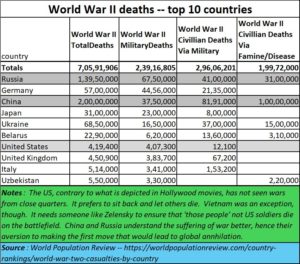 It prefers to prop up someone like Zelensky who is ready to rally his people, and use them as cannon fodder. That in turn spares the US from receiving body-bags. It has been the most callous in using weapons of mass destruction again and again. It has done this in Japan, in experiments in the Marshall Islands (see John Pilger’s documentary trailer https://www.youtube.com/watch?v=AT0hXQZYgwQ) and in dropping depleted uranium bombs in Iraq.
It prefers to prop up someone like Zelensky who is ready to rally his people, and use them as cannon fodder. That in turn spares the US from receiving body-bags. It has been the most callous in using weapons of mass destruction again and again. It has done this in Japan, in experiments in the Marshall Islands (see John Pilger’s documentary trailer https://www.youtube.com/watch?v=AT0hXQZYgwQ) and in dropping depleted uranium bombs in Iraq.
What India must do
India will have to keep all these factors in mind as it tries to map out a path for itself. That could also explain why Prime Minister Modi has decided to visit Rusia, though not for the SCO summit being held in Astana in Kazakhstan (https://www.hindustantimes.com/india-news/pm-modi-s-russia-visit-is-to-prepare-for-global-uncertainty-ahead-101719466034218.html). It is quite clear that Russia will play a bigger role in global affairs than it has for the past two decades.
The Ukraine war and the US sanctions have only helped Russia emerge stronger, and is now standing taller than many European countries. And despite Western media propaganda that Russia attacked Ukraine without provocation, documents by Assange have shown that the US had planned this provocation as early as in 2008 (see the document NYET means NYET by William Burns, currently director of the CIA sent to the government on 1 February 2008). It can be found at https://wikileaks.org/plusd/cables/08MOSCOW265_a.html as well as at (free subscription) https://bhaskarr.substack.com/p/trade-and-currency-wars-move-centre?r=ni0hb&utm_campaign=post&utm_medium=web&triedRedirect=true.
India will have to navigate its way carefully. But for that it will require good advisers. This may mean even changing the composition of the current Prime Minister’s Economic Advisory Council (EAC), It certainly does not help to have misleading statements like Indians are now returning to India, or India will become the Vishwa guru — see timeline 0:19 at https://www.youtube.com/watch?v=1jz_H2QyGCE.
Just look at the figures of Indians leaving India based on the government’s own submissions (https://asiaconverge.com/2023/09/inflated-views-and-deflated-economy/). Similarly, do pay heed to the remarks of Amit Mitra, former secretary general of FICCI when he points out how 35,000 high networth individuals (HNIs) have left India during the present government’s rule (https://www.telegraphindia.com/business/35000-high-net-worth-entrepreneurs-left-india-during-narendra-modi-regime-amit-mitra/cid/1835449).
India’s education remains its biggest stumbling block, leading to increasing unemployability (https://bhaskarr.substack.com/p/poor-education-will-eventually-damn?r=ni0hb&utm_campaign=post&utm_medium=web&triedRedirect=true).
India needs more sagacious advice. Unless that is available, it is possible that the government will take steps that could actually harm India, not save it during these turbulent times.
=========================
Do watch my latest podcast at https://www.youtube.com/watch?v=IbFvtjBT5R4



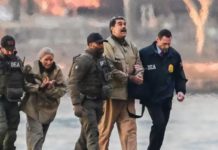
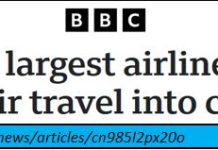
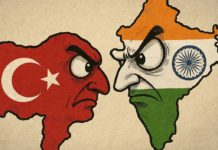
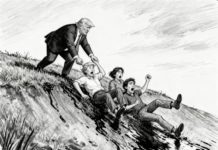






















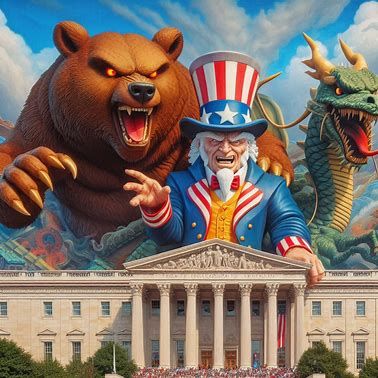
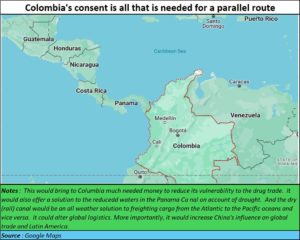
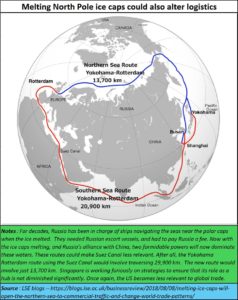
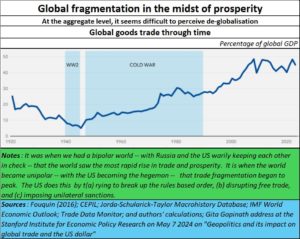







COMMENTS